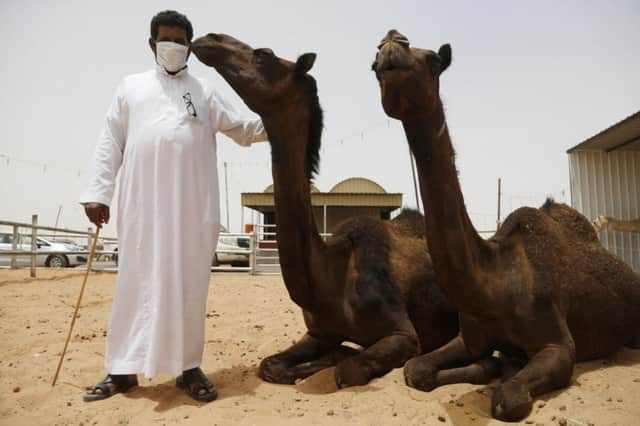Saudis warned, beware the camel


Health experts said camels are the most likely animal source of infection for the disease, which the Saudi health ministry said yesterday that seven more people had caught.
First reported two years ago in Saudi Arabia, Mers is a coronavirus like Sars, which originated in animals and killed around 800 people worldwide after first appearing in China in 2002. There is no vaccine or anti-viral treatment.
Advertisement
Hide AdAdvertisement
Hide AdMore than a quarter of the 480 diagnosed with Mers in Saudi Arabia, still the focal point of the outbreak, have died, while cases have been reported in other Middle Eastern countries, in Europe and in the United States, which had its first confirmed case last month.
The link between human cases and camels is the subject of extensive study among scientists abroad. But it has been relatively absent from much of the official domestic debate.
In a statement, the agriculture ministry advised people not to come into contact with camels unless necessary and to wash hands before and after if they did so, as well as wearing face masks, state news agency SPA said yesterday.
“It is advisable to wear protective gloves, especially when dealing with births or sick or dead [camels],” it said, according to SPA. It also advised only eating cooked camel meat and to boil camel milk before consuming it. The statement urged people to report symptoms of Mers in camels immediately.
Public disquiet in Saudi Arabia has grown amid rumours on social media sites about a lack of transparency from officials about the spread of the disease.
The recent surge in reported cases is also of wider concern, not least because of the influx of visitors from around the world expected in July during the Muslim fasting month of Ramadan, and again during the annual Haj pilgrimage in October.
In a move the health ministry said was aimed at countering the spread of the virus, Riyadh last Tuesday replaced the head of the King Fahd Hospital in Jeddah, where many of the new cases have been recorded.
The World Health Organisation said outbreaks of Mers in the city’s two main hospitals were partly due to breaches in its recommended infection prevention and control measures.
Advertisement
Hide AdAdvertisement
Hide AdAfter a five-day mission in Saudi Arabia, it also said there has been no significant change in the virus’ ability to spread.
Scientists say Mers does not transmit easily between people.
The health ministry first linked Mers with camels at a news conference last month, but the agriculture ministry statement was the first official notification for those working with the animals.
Camels provide a link to an important but vanishing nomadic tradition in Saudi Arabia. They can be traded for thousands of dollars and some are entered into races which are popular in countries across the Gulf region.
Traders, breeders, vets and handlers at the main animal market in Riyadh told Reuters last month authorities had given them no advice or warning about the link between camels and Mers.
Saudi Arabia, a US-ally and conservative absolute monarchy, allows little public dissent and is often secretive about subjects seen as politically sensitive.